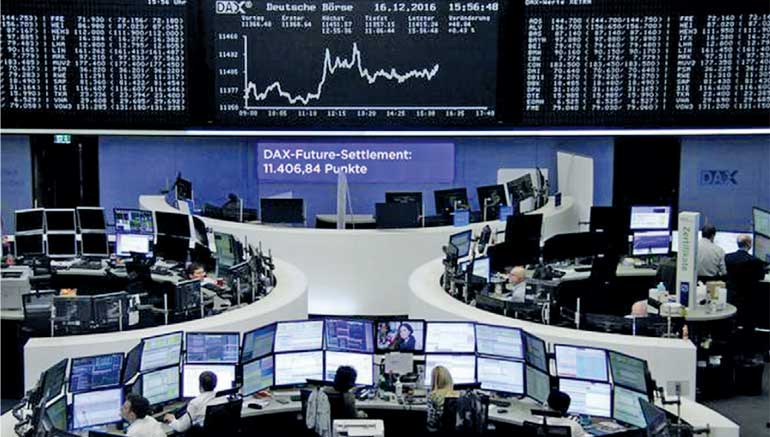Monday Feb 16, 2026
Monday Feb 16, 2026
Tuesday, 20 December 2016 00:10 - - {{hitsCtrl.values.hits}}

London (Reuters): The dollar and U.S. bond yields fell on Monday while Asian shares hit a four-week low, as investors cashed in on some of their recent bets that the anticipated fiscal boost from the incoming Trump administration will support riskier assets.
Wall Street hit record highs and the dollar rose to a 14-year peak last week, but as the last full trading week of the year got underway investors chose to take some of those chips off the table.
The profit-taking spread to Europe, where bank stocks were among the biggest fallers following two weeks of strong gains on the back of rising bond yields. Their decline pushed the broader European indices into the red.
Europe’s index of leading 300 shares was down 0.2%, and banks were down 0.6%. Shares in Italy’s Monte dei Paschi fell 8.5% as it made a last-ditch attempt to raise five billion euros by the end of the year and avoid a state bailout.
Britain’s FTSE 100, Germany’s DAX and France’s CAC were down between 0.1 and 0.4%, and U.S. stock futures pointed to a flat open on Wall Street.
“As we enter the Christmas, year-end holiday season, volumes could decline and lead to choppy price action. Traders should watch out for higher volatility due to restricted holiday trading volumes,” said Ipek Ozkardeskaya, senior market analyst at London Capital Group
MSCI’s broadest index of Asia-Pacific shares outside Japan fell for the third straight day, shedding 0.3% to a four-week low. It has lost 3.7% since Trump was elected.
In addition, investors turned cautious after China’s top leaders said over the weekend they would stem asset bubbles in 2017 and place greater importance on the prevention of financial risk.
Japan’s Nikkei, which has benefited from the yen’s sharp fall against the dollar, snapped its nine-day winning streak, dipping 0.1% from Friday’s one-year high.
Financial markets briefly turned “risk-off” in late U.S. trade on Friday following news that a Chinese Navy warship had seized a US underwater drone in international waters in the South China Sea.
The diplomatic incident appears to have been resolved for now after the two countries said on Saturday that China will return the drone.
In bonds the 10-year U.S. Treasuries yield stood at 2.58% in Europe on Monday, down a basis point on the day but still close to its two-year high of 2.641% touched on Thursday.
It has risen almost 100 basis points from the low in the hours immediately after the Nov. 8 U.S. election. That surge, and the Federal Reserve’s interest rate hike last week, have pushed the dollar sharply higher lately.
The dollar’s index against a trade-weighted basket of six major currencies jumped to a 14-year high of 103.56 last week although it gave up some gains on Monday. The index last stood at 102.68.
The euro traded at $1.0459, bouncing back from last week’s low of $1.03665, its weakest since January 2003, while the dollar fell 0.4% against the yen to 117.50 yen.
“The dollar is acting as a brake on the extent of Fed tightening and the extent of the bond sell-off,” Societe Generale currency analysts wrote on Monday.
“Mr Forex is hyper-sensitive to these bouts of self-doubt by Mr Bond, and the dollar has backed off a little on this Monday morning,” they said.
The Bank of Japan started its two-day policy meeting on Monday and is widely expected to hold policy, including its twin targets of minus 0.10% interest on a part of excess reserves and the 0% 10-year government bond yield.
Oil prices rose in anticipation of tighter crude supply going into 2017 following the decision by OPEC and other producers to cut output.
Brent LCOc1 futures rose 0.5% to $55.51 a barrel, while U.S. West Texas Intermediate crude added 0.6% to $52.22 per barrel.